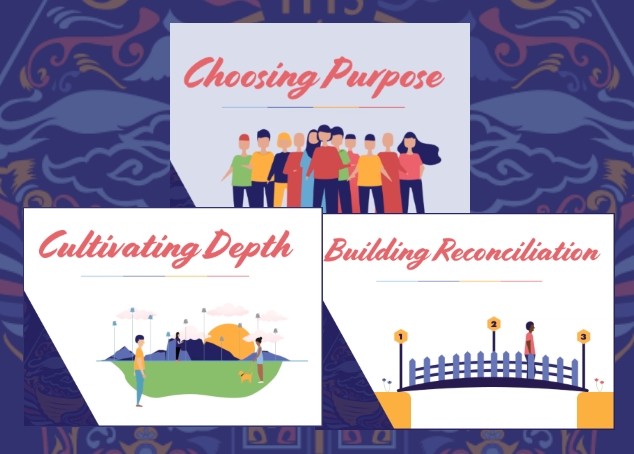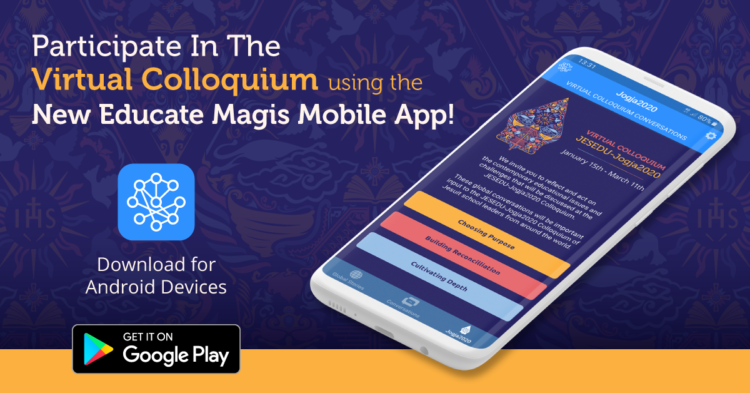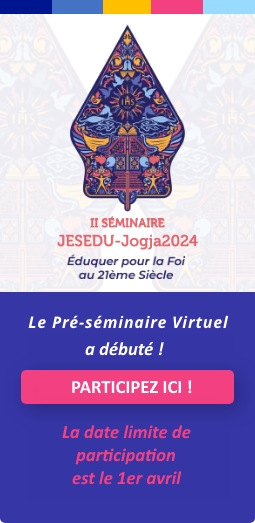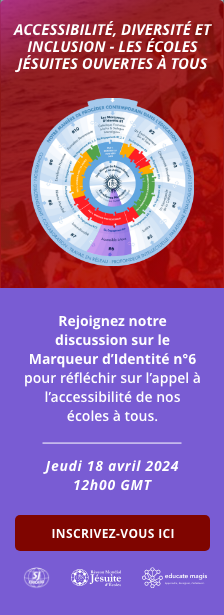We are delighted to share some highlights of the fabulous participation that is happening in the Jogja Virtual Colloquium.
Since January 15th many members of our global community have been sharing their reflections, thoughts, prayers and ideas on challenges that our schools and school communities face today in response to the short videos shared as part of the Virtual Colloquium.
 We are seeing interesting points of views and perspectives on « how to show our students the way to God », « how to accompany our students in their journey », and « how to educate for reconciliation while walking with the excluded, caring for creation and collaborating with others ». Educators from India, Philippines, United States, Colombia, Guatemala, Argentina, Australia and many other countries are talking and reflecting on these topics.
We are seeing interesting points of views and perspectives on « how to show our students the way to God », « how to accompany our students in their journey », and « how to educate for reconciliation while walking with the excluded, caring for creation and collaborating with others ». Educators from India, Philippines, United States, Colombia, Guatemala, Argentina, Australia and many other countries are talking and reflecting on these topics.
The topics presented in this international online event call for deep reflection and will be used as input for the presentations and discussions at the JESEDU-Jogja2020 Colloquium in Indonesia in July. Have you participated yet?
Here are some samples of what the community is saying, and if you haven’t participated in the Jogja Virtual Colloquium yet we invite you to participate through the Virtual Colloquium page or through the new Educate Magis App. We would like to hear as many voices/perspectives from as many different schools and countries as possible.
I really liked the video presentation about helping our students to choose greater good or doing God’s will in their lives. How we do it is really a discernment process that starts with students in their particular given human experience. Hence, context is extremely important before we design an experience according to the Ignatian pedagogy. As teachers try to implement five dimensions of IPP, the Examen can greatly assist us to grow in awareness of the movements that are taking place within us and be grateful to God and others for all our gifts. Hence, I believe we should give great importance to the Examen in our schools along with IPP. I tried to implement the Examen when I was at two Jesuit Schools in India but the challenge was to make it part of the whole school system. It needs the support and cooperation of all.” Vinod, India / “Choosing Purpose”
Within the framework of what the video presents to us and taking into account the question “What does it mean for our mission today to EDUCATE FOR DEPTH?” We believe that educating for depth means working with our students to pause, to make them more aware of the importance of discernment in a world that focuses us very much on « the outside », that is, on the superficiality of what the other person shows us, instead of focusing on the inside, recognizing our interiority and understanding what is happening there: the motions, the feelings, the emotions and the calls to which we must attend. Our mission to educate and accompany young people at this vital time is oriented towards this, so that they realize what their mission is as youth, in order to be able to transform themselves by recognizing themselves in depth and as a consequence transforming their environment. As mentioned in the video, this also implies being able to think critically when reflecting on our own life and what happens around us. Eliana, Colombia / “Cultivating Depth” [Original Comment in Spanish]
St. Xavier’s School, Godavari, Nepal has students from grade 1 to grade 12. Majority of these students are not Catholic or even Christian however they are from a religious families. It is difficult to generally talk about the students however some universal observation could be talked of here. I feel the students today have a lot of information but wisdom (discernment) seems to be lacking. I am more and more convinced that it is not only the students with us that lack wisdom but in general, student’s family and community too lack discernment. Students are the product of the combination of the family, society, school, friends and many other factors. For the parents of the students text books, homework, exam, marks and grade are the most important factor for evaluating education. Therefore, it is necessary that along with our students, parents, guardians and teachers must also be helped to learn to discern. I have observed that our students, by the time they are in grade 12 (those who continue from grade 1-12), develop a certain confidence on discernment, the number may be less but most do show certain level of discernment. The UAP “to show the way to God through discernment and the Spiritual Exercises” is a golden opportunity for our schools to help the students, parents and teachers learn discernment of the spirits after the Spiritual Exercise of St. Ignatius. This is also an opportunity to talk about the Spiritual”Exercises to those who have not head of it yet. I feel we could make a real difference in the lives of people if we sincerely implement this in our schools.” Samuel, Nepal / “Choosing Purpose”
This is a brilliant video! It is challenging and provoking. One of my initial thoughts was that as educators we need to help students not to fear what they do not know. I read this quote recently which I love “There are no foreign lands. It is the traveler only who is foreign.” ― Robert Louis Stevenson I think that we can apply this to so many areas of life. Things that are new and scary are only so until they become comfortable. Helping students feel comfortable in their approach to new situations in both learning and life is something that I think has become more difficult. Many people don’t see failure as valuable (in learning) which means that those that do “fail” or a different to what society sees as normal are shunned. St Ignatius lived a life where mistakes lead to great discovery and I think that using his example with students is so helpful in encouraging continual discovery and contemplation.” Callum, Australia / “Building Reconciliation”
I have to shut down my IPhone, IPad, IWatch, desktop computer and TV more often. I have to get back to quietly reading good, challenging books and articles, quietly reflecting on them and then discussing them with colleagues and community members. My tendency is to over-work and under-reflect. How do I break that tendency? What works for those of you tempted to live the way I do? Thanks. Joe Parkes, PASE for MAR and UNE Provinces.” Joseph, United States / “Cultivating Depth”
Se connecter ou Adhérer
pour créer et afficher des commentaires


